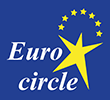Digitalising
Youth
Awareness of
the European
Built Heritage



ArcH App aims at offering efficient interdisciplinary tools and materials to support youth workers in incentivising young people aged 18-30, including marginalised groups, to discover the European dimension of local built heritage and to use digital technology to consolidate new knowledge and promote built heritage protection.
Heritage buildings are potent examples of intercultural exchange at European and international levels.
The project intends to promote active citizenship and civic participation by leveraging the potential of youth as a social multiplier. Through the various activities proposed by the project, young people of diverse sociocultural backgrounds, supported by their youth workers, can become familiar with the buildings’ historical and cultural value and, subsequently, aware of the multiple challenges these buildings are currently facing.


EUROCIRCLE is a youth organization based in Marseille and focused on European and intercultural dimensions. The non-profit has gathered more than 20 years of experience in learning mobilities, inclusion, active citizenship, diversity project. Eurocircle works directly with young people from various backgrounds, local youth organizations as well as youth workers and is very active in the field of youth mobility.
Eurocircle operates as an applicant or partner in different projects such as European programs like: Erasmus+, Europe for Citizens, Asylum – Migration – Integration Funds, Creative Europe, Cosme. We develop and collaborate as well in innovative and experimental programs corresponding to the: Social European Fund and the Fund for Experimental Youth Projects.

Citizens In Power (CIP) is an independent non-profit, non-governmental organization. CIP aims at the development of different ramifications of entrepreneurship, education and democratic dialogue in Cyprus and abroad. To achieve those targets CIP has established an on-going collaboration with the majority of Cypriot leading universities, NGOs and research organizations in Cyprus, especially for the development of innovative projects and international trainings or seminars as well as for the deployment of pedagogical educational material, by primarily using web platforms and other technological innovations.

DRAMBLYS is a non-profit organisation located in Spain, which combines sociological imagination and inquiry with social creativity and design to approach, explore, and innovate solutions to contribute to sustainable development.
DRAMBLYS aspires to serve as an interactive platform and meeting point to exchange, design, inspire and promote social innovation projects and creative alternatives, both globally and locally.

Innovation Hive is a private non-profit organization located in Greece, specialized in the fields of research and innovation. Our actions aim to enhance the economic and social cohesion of European societies while our goal is to find solutions to the new innovation challenges, achieve growth, sustainability and maximize the impact to the society. The organization’s philosophy in order to achieve these goals is based on co-creation methodologies and a quadruple helix approach. The engagement of stakeholders from industry, science and society is aiming to create links between the businesses, the academia and the civic actors in order to develop a combination of knowledge, skills, tools, values and motivation. The final goal is to make the difference in local societies and to succeed at the highest level the principles of social innovation concepts.

The University of Malta is the Islands’ leading higher education institution and over its 400-year history, has been a hub for international academic exchange. Its structures are in line with the Bologna Process and the European Higher Education area, and it attracts students from the EU and elsewhere to the Maltese archipelago, at the center of the Mediterranean Sea. The University hosts some 11,500 students, including around 1,000 international students from 92 different countries and 450 visiting overseas students, following full-time or part-time degree and diploma courses. About 3,500 students graduate in various disciplines annually. The University has eighteen institutes, thirteen centers and fourteen faculties, one of which is the Faculty for the Built Environment.
RESULTS

Modular Training
Through four modules, WP2 will explore how built heritage contributes to the shaping of the urban experience in cities across Europe, with the aim of providing youth workers with useful information and resources that will support them in acquainting their youth groups (18-30) with the core concepts, methods and tools of the project, and guide them throughout its implementation phase. It will also provide information that will help youth workers expand and strengthen their digital skills on how mobile applications are created and work.

Digital Guided Visits to Heritage Buildings
WP3 offers interactive digital maps of 60 buildings from the participating European cities, investing in the popularity of digital technology among young people. Oriented towards the project participants and the cities’ inhabitants and visitors, this WP aims to enrich the urban experience of its users by providing them with the selected buildings’ key historical and architectural facts in an attractive and user-friendly format and therefore sensitise them to the importance of their protection.

Mobile Application
The “Buildings alert!” mobile app aims to connect all previous WPs of the ArcH App project with real-life needs in the participants’ communities. It will be co-constructed by the consortium’s experts and the target group to make it appropriate for local and international use, an accessible-to-all, user-friendly valuable tool, serving the socio-cultural purpose of the heritage buildings’ preservation.

CONTACT
Want to get in touch for information or to become more involved in the project? Do not hesitate!
Please fill in the form bellow and we will get in touch with you as soon as possible.
Funded by the European Union. Views and opinions expressed are however those of the author(s) only and do not necessarily reflect those of the European Union or the European Education and Culture Executive Agency (EACEA). Neither the European Union nor EACEA can be held responsible for them.
Project Number: KA220-YOU-7E2A8558

